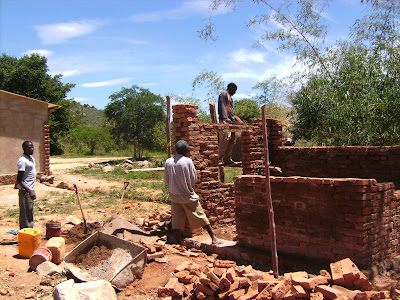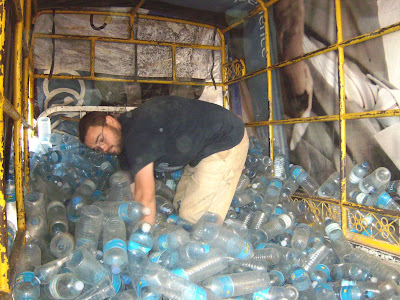Since the summer staff left in September, Elliot and Abbas have been very busy with projects, interviews, village meetings, and budget writing.
Primary School Update:
Since the summer the Standard 7 classroom at the Ulonge Primary School has been completed, and desks have been built to accommodate the new class of students that will start in January. Project Kesho is very excited about the completion of this classroom. When we first started working with the Ulonge community in 2007, there were only four completed classrooms at the primary school. Over the last two years, by partnering with the local community and other nonprofit groups, we were able to facilitate the construction of three classrooms and additional office space. Now, all the children in the Ulonge community are able to go to school in their own community as opposed to walking the four mile round trip to the Lundamatwe Primary School. Next spring, we will facilitate the construction of an additional classroom to house a Pre-Primary class. The Pre-Primary class is similar to kindergarten in America. It helps to get students ready for Primary school and also provides the students with a feeding program. Currently, the teachers of the Ulonge Primary School are conducting a Pre-Primary class during the school’s lunch hour and we are currently constructing a kitchen area. The kitchen area will make the feeding program possible and Project Kesho will be working to facilitate the proper classroom space in the spring of 2010 for the Pre-Primary classroom.
Project Kesho has been working with the Kibati community over plans for a new Primary School. The Kibati community is located in a remote part of the Lundamatwe Village. Parts of the community are 5 miles one way from the Lundamatwe Primary School (the closest school). During this past summer, Kibati Community leaders approached us about their desire to have a Primary School in their community because of the great distance. Project Kesho was very excited about this development and were eager to partner with the community. Because of the community’s intense desire to have a school and assurances from the necessary government officials that a school here will be certified, we have decided to move ahead with the construction of a new school. During the fall and winter, we will be facilitating the construction of one classroom, an office space, and bathroom facilities for the school. We anticipate that these construction projects will be completed by the spring of 2010, and after that we will begin the task of getting the school certified by the Tanzanian government so that they will assign a head master and the proper number of teachers.
Clean Water:
Working with representatives of local communities, Elliot and Abbas have identified two new sites for borehole construction. In the past, we were concerned about the quality of the water that the boreholes we constructed were pumping up. While we are still concerned about this, further investigation into the issues surrounding clean water have lead us to question the cleanliness of how people are storing the water once the water is brought home. It is great if the water that is pumped to the surface is clean and safe to drink, but if that water is stored in an unsanitary container it negates the advantage of using a pump and borehole. Through our continued presence in these communities, we have learned that many people do not have a sanitary storage container for storing household water. Building off this newly acquired understanding of the water situation we have adjusted our approach towards clean water. We are now more concerned about treating drinking water and storing it in a clean container. To address this, we have partnered with a local Anglican priest who has been working to address these very same issues through an approach called Solar Disinfectant (SODIS). SODIS works by using sunlight to disinfect water in plastic bottles. It is recommended by the World Health Organization for the safe treatment of drinking water and the safe storage of water. It is remarkably easy to do as well—one simply has to fill up a bottle of water and let it sit in direct sunlight for 6 hours. The water is then cleaner than if you had boiled it ten times. We are implementing this at the schools, starting with the Ulonge School and then moving to the Lundamatwe School. We plan to provide every student with two bottles, one to use for drinking during the day while the other is in the sun purifying the water for the next day. This local priest has been conducting the training sessions at the schools. Once this takes off at the schools, we will be expanding training sessions to community groups throughout the Lundamatwe Village. We will also post illustrated instructions and demonstration areas near the previously constructed boreholes.
The following two pictures are of the completed Standard 7 classroom at the Ulonge Primary School.


This is a picture of the construction of the new kitchen facility at the Ulonge Primary School:

This is the new borehole in the Viwengi community of the Lundamatwe Village. This provides a year round access point to water for this community that saves the people a 2 mile round trip to collect water:

The following are two pictures of the SODIS training at the Ulonge Primary School:


Elliot helping to deliver water bottles of the students at the Ulonge Primary School to use to sanitize their drinking water with SODIS:

A picture of the Matungulu community of the Lundamatwe Village where the new borehole will be located:


 This is a picture of the construction of the new kitchen facility at the Ulonge Primary School:
This is a picture of the construction of the new kitchen facility at the Ulonge Primary School:
 This is the new borehole in the Viwengi community of the Lundamatwe Village. This provides a year round access point to water for this community that saves the people a 2 mile round trip to collect water:
This is the new borehole in the Viwengi community of the Lundamatwe Village. This provides a year round access point to water for this community that saves the people a 2 mile round trip to collect water:
 The following are two pictures of the SODIS training at the Ulonge Primary School:
The following are two pictures of the SODIS training at the Ulonge Primary School:

 Elliot helping to deliver water bottles of the students at the Ulonge Primary School to use to sanitize their drinking water with SODIS:
Elliot helping to deliver water bottles of the students at the Ulonge Primary School to use to sanitize their drinking water with SODIS:
 A picture of the Matungulu community of the Lundamatwe Village where the new borehole will be located:
A picture of the Matungulu community of the Lundamatwe Village where the new borehole will be located:


No comments:
Post a Comment